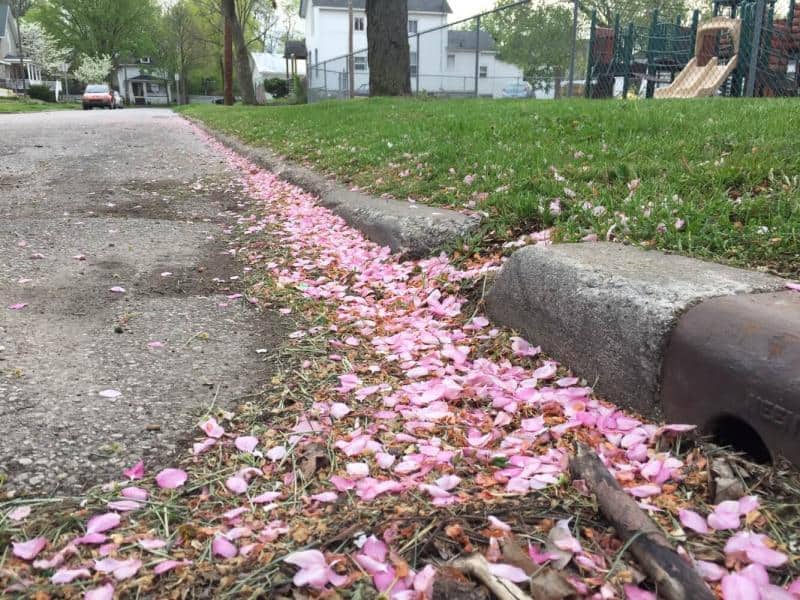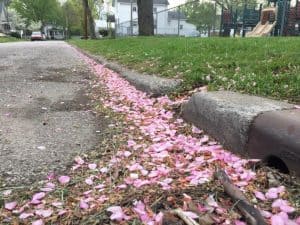“We’re closing soon,” the man at the soup kitchen said, looking me up and down. I had been tugging on the locked glass doors when he saw me. “Can I help you with something?”
I’ve come to understand that Can I help you? is what people say when they’re irritated. It was Friday, and almost noon, and I couldn’t blame him for not wanting to let me in.
“Well, I’m a nurse,” I said with my best friendly face, “and I’m doing a project about health in our community and just wondered if there’s someone I could talk to briefly.”
(“Don’t call ahead to set up an appointment; just walk in,” the teacher from my online Community Health Class told me over the phone. ” Always lead with ‘I’m a nurse.’ People always want to help nurses.” The project looked daunting. I needed to get in 40 hours of time. The mentor told me I could count half an hour for writing up my interviews, but it still looked daunting as I set out into Elkhart County. I visited Elkhart Central High School, the WIC office, Rise’n Roll, the Essenhaus, Church Community Services food pantry and Seed to Feed program, the Goshen farmer’s market, the Health Department, Heart City Health Care, and a number of departments in the hospital that I had never been to before.)
“Well…Pastor Amy’s over here,” the man said slowly, as we climbed the steps into a big empty room. We crossed the room and looked into an office, where a middle-aged woman was reading something on her computer screen. She didn’t look up.
After a moment, she glanced at me.
“My name is Katrina and I’m a nurse,” I said. “I’m doing a project about healthy eating and exercise and obesity in our community and just wondered if I could find out a little bit about your ministry here.”
Thankfully, she invited me to sit down. I had left my purse and computer in my Corolla, which I had parked beside a house with a group of young men lounging on the porch. I had locked it, of course, but I couldn’t help hoping those items were still in my car.
“I have a man right now sleeping in his van in my parking lot,” she said. “I work with homeless shelters and agencies all over the city. A lot of people need someone to do the legwork or the phone calls for them. You can’t just hand someone paperwork and expect them to be able to figure it out.”
“Especially if they can’t read,” I suggested.
“Right,” she agreed. “Homeless people aren’t obese, unless they’re newly homeless. There are some people that come to the soup kitchen who are. Junk food is cheap, and if you don’t have a job, you’re less active. A lot of mothers are addicts, and I have children coming to me saying ‘Pastor Amy, I’m hungry’, especially after school is out. I keep a jar of peanut butter and jelly and hot dogs on hand, and we always have a gallon of milk here in the summer. We don’t always have enough money, no, because I don’t accept government money. I share Jesus with people all the time, and I don’t want to be restricted in that.”
“Just by the way,” I said, “I know my neighbor Rose comes here…Rose and Bill?”
“I know a lot of faces,” she said, “but not so many names.”
“She goes around my neighborhood knocking on doors asking for things,” I said. “I don’t always know how to handle it.”
I saw a recognition in her eyes.
“Rose is addicted to crack cocaine,” she said. “At least if it’s the Rose I know. So don’t give her money if she asks for an inhaler.”
“I hire them a lot,” I said.
“That’s fair enough,” she said.
“We’ve helped a lot of people get off the streets,” she said, not with pride, but with a sense of calling and joy. Somehow, she has navigated all these years without getting cynical or bitter, even when speaking about my neighbor Rose. She just said it simply, factually: Rose is addicted to crack cocaine.
My computer and purse were still in my car when I returned to it. I had gathered information for my project, but I was also blessed to listen to someone who had spent their life with a population of people who can be very difficult to work with.
I listened to a woman speaking on poverty the other night. She said she had a woman get so frustrated once because she gave a family $200 for new clothes and they bought a DVD player.
The speaker turned to us, a large middle-class audience with nice cars, nice clothes, and more food than we need, and told us about a lady she knew on the North Shore of Chicago who she had offended by telling her artwork looked “like a Picasso” when in reality it was a 1.4 million dollar painting.
“What would you do if someone gave you a $1.4 million Picasso?” she asked us. “Come on, tell me!”
“SELL IT!!” we said in perfect unison.
“You’d say to yourself, I lived this long without a Picasso, I can live some more!”
There’s a lot of debate of how best to help poor people, and some people think it should look like this and others think it should look like that, and some poor people are demanding, or in denial that they need help at all, and so it’s easy to get cynical and just quit. Sometimes, a different perspective helps, so, even though I was dreading my project, I’ve found it to be very insightful.
But one thing that’s hard to argue with, is a woman like Amy, who keeps a jar of peanut butter and a gallon of milk on hand and gives them out in the name of Jesus, summer after summer.

*Names have been changed*





1 thought on “A Jar of Peanut Butter”
Wow! You have written a thought provoking blog! Thank you! God bless you!